27-01
The Lawyer's Question [27-01]
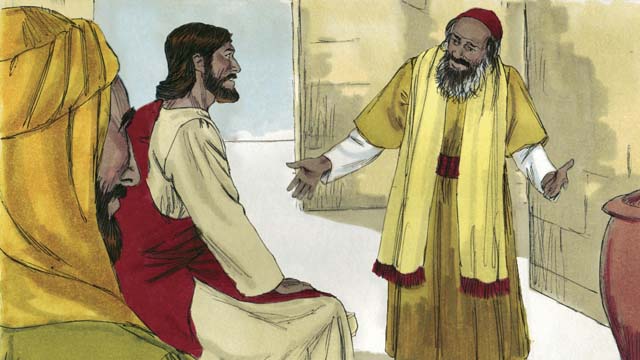
One day, an expert in the Jewish law came to Jesus to test him, saying, “Teacher, what must I do to inherit eternal life?” Jesus answered, “What is written in God's law?”
一天,一个律师来到耶稣面前试探他,说:“老师,我怎样才能长生不老呢?”耶稣回答说:“圣经里面怎么说的呢?”
Important Terms:
Translation Notes:
- One day - This phrase introduces an event that happened in the past, but does not state the specific time. Many languages have a similar way to begin telling a true story.
- expert in the Jewish law - This man was someone who studied and taught the laws God had given the Israelites, as well as other Jewish laws.
- to test him - That is, "to see if Jesus would give a good answer."
- to inherit eternal life - That is, "to have life with God forever" or, "so that God will give me life with him forever" or, "to receive eternal life from God." The law expert was asking how he could be worthy to receive eternal life as an inheritance from God the Father.
- eternal life - This refers to life forever with God after the mortal body dies. See the key term page for eternal life.
- What is written in God's law? - That is, "What is written in God's law about this?" Jesus asked this question because he wanted the man to think about what God's law really teaches.
27-02
Obey the Commandments [27-02]
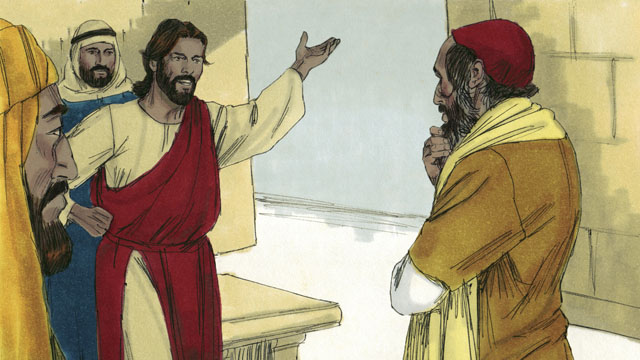
The law expert replied that God's law says, “Love the Lord your God with all your heart, soul, strength, and mind. And love your neighbor as yourself.” Jesus answered, “You are correct! Do this and you will live.”
“用尽你所有的心思,灵魂,力量和思想爱你的主,并且爱你的邻居像爱自己一样”律师说道,耶稣说:“完全正确,你可以照着经上说的去做。”
Important Terms:
Translation Notes:
- law expert - That is, "an expert in the Jewish law." See how you translated this term in [[:zh:obs:notes:frames:27-01|[27-01]]].
- Love the Lord your God - You may choose to say, "We must love the Lord our God." Make sure it does not sound like the man is commanding Jesus. Rather, he is quoting what God's law commands people to do.
- with all your heart, soul, strength, and mind - That is, "with your whole self" or, "with every part of yourself." In some languages this might be translated as, "with all your liver, breath, strength, and thoughts." The focus is not on each of these parts, but on all of us. Use the concepts in your language that make up the whole person.
- heart - The heart refers to the part of a person that has desires and emotions.
- soul - The soul refers to the nonphysical, spiritual part of a person.
- strength - Strength refers to the physical body and all of its abilities.
- mind - The mind refers to the part of a person that thinks, plans, and has ideas.
- neighbor - The word "neighbor" normally refers to a person who lives near us. The Jews applied the term to someone who was neither a close relative nor a foreigner or enemy.
- love your neighbor as yourself - That is, "love your neighbor to the same extent that you love yourself."
27-03
Who Is My Neighbor? [27-03]
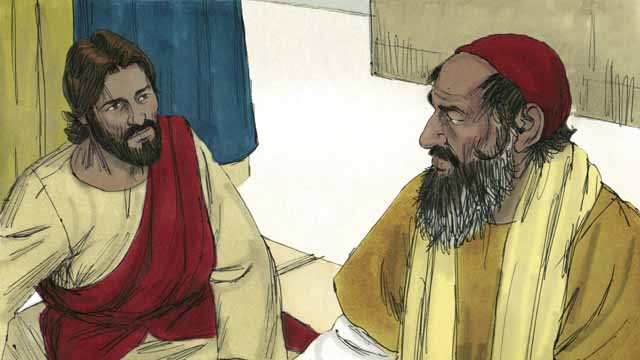
But the law expert wanted to prove that he was righteous, so he asked, “Who is my neighbor?”
但是律师想要证明自己才是对的,他又问道’谁是我的邻居呢?
Important Terms:
Translation Notes:
- law expert - That is, "an expert in the Jewish law." See how you translated this term in [[:zh:obs:notes:frames:27-01|[27-01]]].
- Who is my neighbor? - This could also be translated as, "What do you mean by 'neighbor'?" or, "Which people are my neighbors?" He knew that he did not love everyone, and was asking which people he needed to love.
27-04
The Jewish Traveler [27-04]

Jesus answered the law expert by telling a story. “There was a Jewish man who was traveling along the road from Jerusalem to Jericho.”
耶稣用一个故事回答了他的疑问。“曾经有一个犹太人,她从耶路撒冷去往杰利科”
Important Terms:
Translation Notes:
- (The cloud-like frame around this picture indicates that Jesus is telling a story, and not necessarily explaining a historical event.)
- law expert - See how you translated this term in [[:zh:obs:notes:frames:27-01|[27-01]]].
- from Jerusalem to Jericho - In some languages you could translate this as, "from the city of Jerusalem to the city of Jericho" or, "from Jerusalem City to Jericho City."
27-05
The Robbers [27-05]
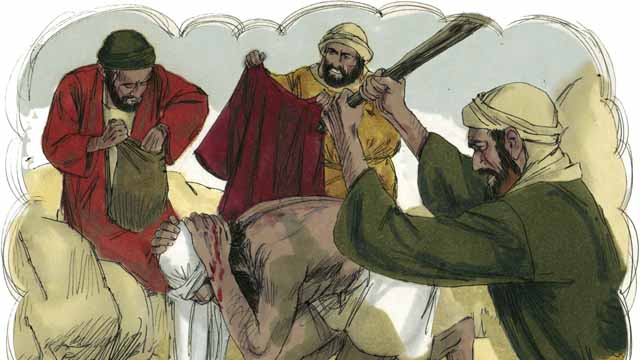
“While the man was traveling, he was attacked by a group of robbers. They took everything he had and beat him until he was almost dead. Then they went away.”
在路途中,他遭遇了一群强盗的打劫。他们将他洗劫一空,并且毒打一顿之后逃之夭夭。
Important Terms:
Translation Notes:
- (Jesus continues to tell the story.)
- everything he had - That is, "everything he had with him, including the clothes he was wearing."
27-06
The Priest [27-06]

“Soon after that, a Jewish priest happened to walk down that same road. When this religious leader saw the man who had been robbed and beaten, he moved to the other side of the road, ignored the man who needed help, and kept on going.”
不一会儿,一个犹太牧师碰巧路过这条路。当这个宗教领袖看见那个被打劫的人躺在路边时,他完全无视这个可怜人,仍然继续走自己的。
Important Terms:
Translation Notes:
- (Jesus continues to tell the story.)
- happened to walk down - That is, "happened to be traveling along." For some languages it may be necessary to use a word like "travel" rather than "walk" since the priest was not just walking on the road but was traveling to get to another city.
- ignored the man - That is, "did not help the man" or, "showed no concern for the man."
- kept on going - That is, "continued traveling down the road."
27-07
The Levite [27-07]

“Not long after that, a Levite came down the road. (Levites were a tribe of Jews who helped the priests at the Temple.) The Levite also crossed over to the other side of the road and ignored the man who had been robbed and beaten.”
没过多久,一个利未人也经过这条路。(利未是犹太的一个部落,他们在圣殿帮助牧师们。)利未人同样走在道路的另一侧,无视这个遭遇打劫和毒打的可怜人。
Important Terms:
Translation Notes:
- (Jesus continues to tell the story.)
- came down the road - That is, "was traveling down that same road."
- Levites were a tribe of Jews - That is, "Levites were from the Israelite tribe of Levi" or, "Levites were from the Israelite clan of Levi."
- ignored - That is, "did not help."
27-08
The Samaritan [27-08]

“The next person to walk down that road was a Samaritan. (Samaritans were the descendants of Jews who had married people from other nations. Samaritans and Jews hated each other.) But when the Samaritan saw the Jewish man, he felt very strong compassion for him. So he cared for him and bandaged his wounds.”
下一位路过的是一个撒玛利亚人。(撒玛利亚人是犹太族和其它民族的后裔。撒玛利亚人和犹太人曾经互相憎恨彼此。)当撒玛利亚人看见这个人时,他充满了同情,怜悯。他细心照顾他,并且为他包扎伤口。
Important Terms:
Translation Notes:
- (Jesus continues to tell the story.)
- walk down - That is, "travel along." These people were traveling from one city to another. Make sure that it does not sound like they were just taking a walk.
27-09
Help for the Victim [27-09]
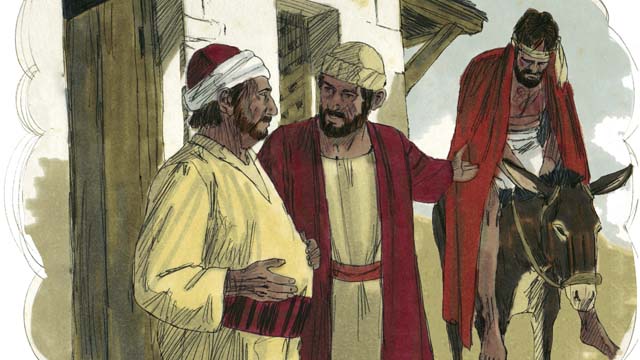
“The Samaritan then lifted the man onto his own donkey and took him to a roadside inn where he took care of him.”
撒玛利亚人将他抬到自己的驴上 ,把他带到客栈照料他。
Important Terms:
Translation Notes:
- (Jesus continues to tell the story.)
- his own donkey - Make sure it is clear that "his" refers to the Samaritan.
- roadside inn - That is, "a lodging place." This is a place where travelers could get food and stay overnight.
- where he took care of him - This could also be translated as, "where he continued to take care of him."
27-10
Generous Help [27-10]
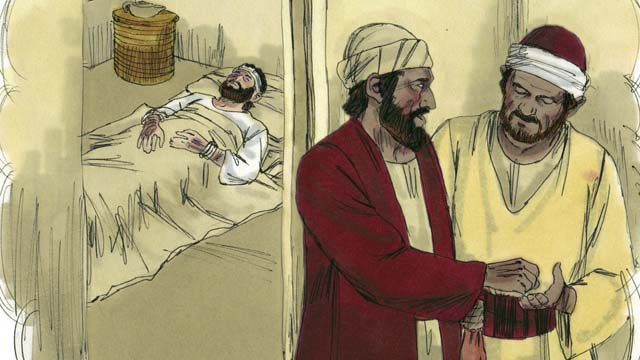
“The next day, the Samaritan needed to continue his journey. He gave some money to the person in charge of the inn and said, ‘Take care of hi__m, and if you spend any more money than this, I will __repay those expenses when I return.’”
次日,撒玛利亚人需要继续赶路。他给了客栈的主人一些钱,说道:“请照料他,如果花了多余的钱,我回来的时候会再支付给你。‘
Important Terms:
Translation Notes:
- (Jesus continues to tell the story.)
- continue his journey - This could be translated as, "continue traveling toward his destination."
- in charge of - That is, "who managed." It could be that this person also owned this lodging place.
- Take care of him - For some languages it may be preferable to say, "Please take care of him" in order for it to be clear that this was a polite request, not an order.
- repay those expenses - This could also be translated as, "repay you" or, "repay that money" or, "repay it."
27-11
Do the Same [27-11]
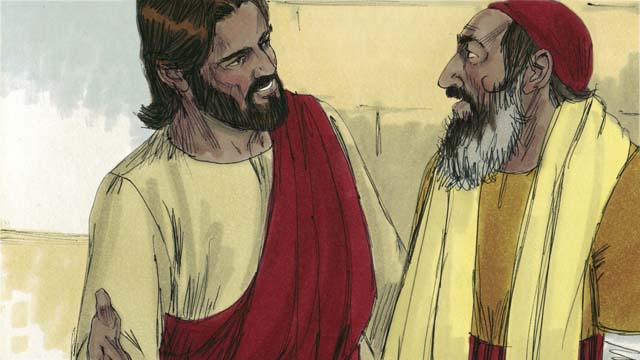
Then Jesus asked the law expert, “What do you think? Which one of the three men was a neighbor to the man who was robbed and beaten?” He replied, “The one who was merciful to him.” Jesus told him, “You go and do the same.”
耶稣问律师:“你认为,对于一个遭遇打劫和毒打的人来说,这三个人之中谁才是自己的邻居呢?”律师回答说:“那个有仁慈的撒玛利亚人。”耶稣说,“你也可以去做同样的事情。”
Important Terms:
Translation Notes:
- law expert - That is, "an expert in the Jewish law." See how you translated this term in [[:zh:obs:notes:frames:27-01|[27-01]]].
- the three men - The three men were the priest, the Levite, and the Samaritan.
- neighbor - Jesus is using the word "neighbor" in a broader sense than in [[:zh:obs:notes:frames:27-02|[27-02]]]. "Neighbor" here refers to anyone that we meet who needs our help.
- was a neighbor - This can also be translated as, "behaved as a neighbor" or, "was a friend" or, "acted in a loving way". See how you translated "neighbor" in [[:zh:obs:notes:frames:27-02|[27-02]]] and [[:zh:obs:notes:frames:27-03|[27-03]]].
- You go and do - That is, "You, too, should go and do" or, "Now you must do." Jesus was commanding the law expert to do as the Samaritan did.
- do the same - That is, "love others, even your enemies." Make sure it does not sound like "the same" is only referring to helping a wounded man.
- A Bible story from - These references may be slightly different in some Bible translations.
